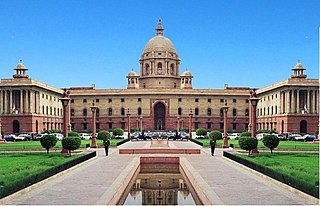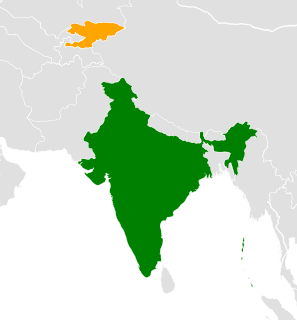The Planning Commission was an institution in the Government of India, which formulated India's Five-Year Plans, among other functions.

The Indian Ocean Rim Association (IORA), formerly known as the Indian Ocean Rim Initiative and Indian Ocean Rim Association for Regional Cooperation (IOR-ARC), is an international organisation consisting of 22 coastal states bordering the Indian Ocean. The IORA is a regional forum, tripartite in nature, bringing together representatives of Government, Business and Academia, for promoting co-operation and closer interaction among them. It is based on the principles of Open Regionalism for strengthening Economic Cooperation particularly on Trade Facilitation and Investment, Promotion as well as Social Development of the region. The Coordinating Secretariat of IORA is located at Ebene, Mauritius.

The Licence Raj or Permit Raj is the elaborate system of licences, regulations and accompanying red tape that were required to set up and run businesses in India between 1947 and 1990. The term plays off "British Raj", the period of British rule in India. It was coined by Indian freedom fighter and statesman Chakravarthi Rajagopalachari, who firmly opposed it for its potential for political corruption and economic stagnation, founding the Swatantra Party to oppose these practices.

The Union Public Service Commission, commonly abbreviated as UPSC, is India's premier central recruiting agency. It is responsible for appointments to and examinations for All India services and group A & group B of Central services. While Department of Personnel and Training is the central personnel agency in India.

The Federation of Indian Chambers of Commerce and Industry (FICCI) is an association of business organisations in India. Established in 1927, on the advice of Mahatma Gandhi by GD Birla and Purushottam Das Thakurdas, it is the largest, oldest and the apex business organization in India. It is a non-government, not-for-profit organisation. FICCI draws its membership from the corporate sector, both private and public, including SMEs and MNCs. The chamber has an indirect membership of over 250,000 companies from various regional chambers of commerce. It is involved in sector-specific business building, business promotion and networking. It is headquartered in the national capital New Delhi and has a presence in 12 states in India and 8 countries across the world.
The Investment Company Institute (ICI) is the leading global association of regulated funds, including mutual funds, exchange-traded funds, closed-end funds and unit investment trusts in the United States, and similar funds offered to investors in jurisdictions worldwide. ICI encourages adherence to high ethical standards, promotes public financial literacy of funds and investing, and advances the interests of investment funds and their shareholders, directors, and advisers.

The Finance Commission was established by the President of India in 1951 under Article 280 of the Indian Constitution. It was formed to define the financial relations between the central government of India and the individual state governments. The Finance Commission Act, 1951 additionally defines the terms of qualification, appointment and disqualification, the term, eligibility and powers of the Finance Commission. As per the Constitution, the Commission is appointed every five years and consists of a chairman and four other members.
The Corporate sector of Pakistan is an elite business sector expanded in financial cities of Pakistan, and a policy measure programme in the economic period of Pakistan. This programme is also regarded as "Pakistan Inc.", which is a drive common term used by the mass-media of Pakistan to refer to the corporate sector of the nation. This policy measure programme was first conceived, envisioned and implemented then-Finance Minister Ghulam Ishaq Khan and President General Zia-ul-Haq in order to lay the foundation of Western styled corporate sector. President Zia-ul-Haq issued the decree, the Companies Ordinance No. 1984, in 1984 that legally allows a variety of formations in the mixed economy of Pakistan.
The Ministry of Personnel, Public Grievances and Pensions is a ministry of the Government of India in personnel matters specially issues concerning recruitment, training, career development, staff welfare as well as the post-retirement dispensation.

The Ministry of Finance is an important ministry within the Government of India concerned with the economy of India, serving as the Indian Treasury Department. In particular, it concerns itself with taxation, financial legislation, financial institutions, capital markets, centre and state finances, and the Union Budget.
The Ministry of Mines, a branch of the Government of India, is the apex body for formulation and administration of the rules and regulations and laws relating to mines in India. The head of the ministry is Pralhad Joshi since June 2019.

India–Kyrgyzstan relations is the relation between India and Kyrgyzstan.
Dr Ashok Shekar Ganguly noted industry expert and former chairman of Hindustan Lever, was a nominated member of the Rajya Sabha. His term ended on 17 November 2015.

The Fiscal Responsibility and Budget Management Act, 2003 (FRBMA) is an Act of the Parliament of India to institutionalize financial discipline, reduce India's fiscal deficit, improve macroeconomic management and the overall management of the public funds by moving towards a balanced budget and strengthen fiscal prudence. The main purpose was to eliminate revenue deficit of the country and bring down the fiscal deficit to a manageable 3% of the GDP by March 2008. However, due to the 2007 international financial crisis, the deadlines for the implementation of the targets in the act was initially postponed and subsequently suspended in 2009. In 2011, given the process of ongoing recovery, Economic Advisory Council publicly advised the Government of India to reconsider reinstating the provisions of the FRBMA. N. K. Singh is currently the Chairman of the review committee for Fiscal Responsibility and Budget Management Act, 2003, under the Ministry of Finance (India), Government of India.
The Pooled Finance Development Fund Scheme (PFDF) has been set up by the Central Government of India. The main aim of the Government authorities is to provide credit enhancement facilities to Urban Local Bodies (ULBs) based on their credit worthiness. This will enable them to access market borrowings through state-level pooled mechanism. PFDF is to ensure availability of resources to Urban Local Bodies in order to improve urban infrastructure and ultimately attain the goal of self-sustainability.

India-Ghana relations are bilateral diplomatic relations between India and Ghana. As members of the Commonwealth, India maintains a High Commission in Accra and Ghana has its High Commission in New Delhi.
Madras Export Processing Zone (MEPZ) is a special economic zone in Chennai, India. It is one of the seven export processing zones in the country set up by the central government. It was established in 1984 to promote foreign direct investment, enhance foreign exchange earnings, and create greater employment opportunities in the region.

The South Asia Subregional Economic Cooperation (SASEC) Program, set up in 2001, brings together Bangladesh, Bhutan, India, Maldives, Myanmar, Nepal, and Sri Lanka in a project-based partnership to promote regional prosperity by improving cross-border connectivity, boosting trade among member countries, and strengthening regional economic cooperation. As of October 2018, SASEC countries have implemented 50 regional projects worth over $11 billion in the energy, transport, trade facilitation, economic corridor development, and information and communications technology (ICT) sectors. The Manila, Philippines-based Asian Development Bank (ADB) serves as the Secretariat for the SASEC member countries.
Foreign direct investment (FDI) in India is a major monetary source for economic development in India. Foreign companies invest directly in fast growing private Indian businesses to take benefits of cheaper wages and changing business environment of India. Economic liberalisation started in India in wake of the 1991 economic crisis and since then FDI has steadily increased in India, which subsequently generated more than one crore jobs. According to the Financial Times, in 2015 India overtook China and the United States as the top destination for the Foreign Direct Investment. In first half of the 2015, India attracted investment of $31 billion compared to $28 billion and $27 billion of China and the US respectively.

India–Papua New Guinea relations refer to foreign relations between India and Papua New Guinea. Papua New Guinea has a High Commission in New Delhi, whilst India operates a High Commission in Port Moresby. Thé relationship between both these nations is said to be very cordial and close.








